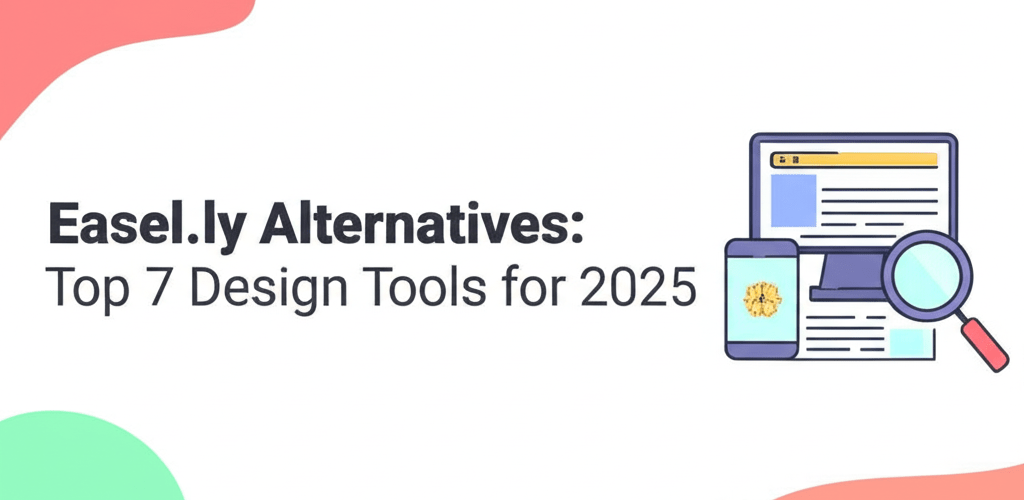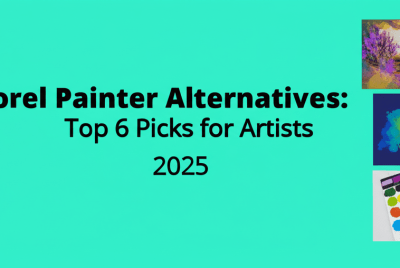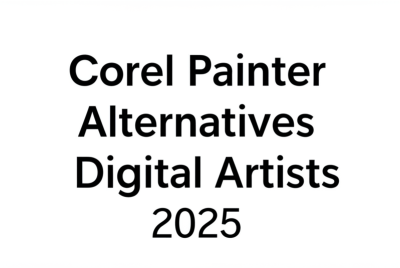Easel.ly Alternatives: Top 7 Design Tools for 2025
Thinking about switching up your design tools? Easel.ly has been a go-to for many, especially for quick infographics and visual content without needing a deep dive into graphic design. Its drag-and-drop interface and templates make it super accessible. But hey, it’s a big design world out there, and you might be looking for something with more punch, a different price tag, or just a fresh vibe. If that’s you, you’re in the right place. Let’s explore some fantastic Easel.ly alternatives that might be your next favorite tool.
- Canva is a top-tier choice for beginners, social media managers, and marketing teams, offering a vast template library and collaborative features.
- For powerful vector graphics editor and professional illustrations without the cost, Inkscape is an excellent open-source option.
- Need professional-grade design power? Affinity Designer stands out with its robust vector and raster capabilities for serious graphic designers.
- Other strong Easel.ly competitors include Piktochart for data visualization, Venngage for brand consistency, and Adobe Express for quick designs within the Adobe ecosystem.
What are the top Easel.ly alternatives for creating stunning visual content?
Choosing your next visual content creation tool really comes down to what you need, your budget, and how much design experience you have. While Easel.ly is fantastic for basic infographics, other platforms open up a much wider range of design possibilities, offer more advanced features, or even provide a completely free Easel.ly alternative experience. Here’s a quick look at some of the best choices available to designers today:
| Alternative | Key Features | Best For |
|---|---|---|
| Canva | Huge template library, photo editing, brand kits, team collaboration | Beginners, social media graphic design, marketing teams |
| Piktochart | Infographics, presentations, reports, printables for data visualization | Data visualization, professional reports |
| Venngage | Specialized infographic templates, strong brand guidelines enforcement | Businesses, marketing, HR departments |
| Adobe Express | Social media graphics, web pages, short videos, integrates with Adobe Creative Cloud | Quick designs, users already in the Adobe ecosystem |
| Inkscape | Open-source vector graphics editor, extensive features for detailed illustrations | Professional vector art, detailed illustrations |
| Affinity Designer | Vector and raster design, professional-grade tools, one-time purchase | Graphic designers, illustrators, UI/UX designers |
Which free Easel.ly alternatives offer robust features for designers?
Cost is often a major concern for many of us. Luckily, there are some truly powerful design tools out there that come with generous free plans or are completely open-source, making them fantastic free Easel.ly alternative options. Canva, for example, offers an incredibly rich free tier. You get access to thousands of templates, photos, and design elements, which is perfect for your everyday design needs, from social media posts to basic infographics. It’s super user-friendly and always getting better with updates.
Another awesome free choice, especially if you’re thinking about diving into more detailed graphic design, is Inkscape. As an open-source vector graphics editor, Inkscape gives you professional-level tools to create scalable vector art, striking logos, and complex illustrations. It might have a bit of a steeper learning curve compared to Easel.ly, but the sheer power and flexibility it offers without costing a dime make it invaluable for dedicated designers. If you’re new to graphic design and want some foundations, checking out Easel.ly tips for beginners could be a helpful first step before exploring powerful software like Inkscape.
How do Easel.ly and Affinity Designer compare for professional graphic design?
When we look at Easel.ly vs Affinity Designer, we’re comparing two very different kinds of tools. Easel.ly is really an online infographic maker, built for simplicity and getting your visual message across fast. Affinity Designer, on the other hand, is a serious desktop application that brings together both vector and raster design capabilities. It’s a strong contender against big names like Adobe Photoshop and Illustrator, offering a comprehensive toolkit for graphic designers, illustrators, and UI/UX artists.
Affinity Designer gives you incredible control over your projects. You can create intricate vector illustrations, work with precise typography, and manage colors with advanced precision. While it’s a one-time purchase, its capabilities go far beyond Easel.ly’s in terms of professional output and design flexibility. For more detailed insights into professional design tools, you might find a comparison like Easel.ly vs Photoshop quite relevant, as they both highlight the spectrum of design complexity.
When should I choose Easel.ly for simplicity or Inkscape for open-source power?
The choice between Easel.ly vs Inkscape boils down to whether you prioritize ease-of-use or raw design power. Easel.ly shines in its straightforward approach, offering a web-based, template-driven experience that’s perfect for users who need to whip up visually appealing infographics quickly, without needing prior design expertise. It truly streamlines the creative process with its intuitive drag-and-drop features.
Inkscape, conversely, is a robust, open-source vector graphics editor. It gives you a vast arsenal of tools for crafting intricate vector art, logos, and technical drawings. While it offers immense creative freedom and doesn’t cost a penny, its interface and workflow are more akin to professional design software. This means it requires a bit more time and effort to learn the ropes. For designers ready to move past basic template customization and dive into original vector creation, Inkscape is a formidable choice among the best Easel.ly apps for advanced design.
Who are Easel.ly’s strongest competitors and what unique features do they offer?
Beyond the direct comparisons, several other platforms stand out as strong Easel.ly competitors. Each one brings its own unique strengths to the table, catering to different design needs:
- Piktochart: This tool is famous for its focus on data visualization. It provides a more structured way to create infographics, presentations, and reports, complete with excellent charts and maps that make complex data easy to understand.
- Venngage: Similar to Piktochart, Venngage specializes in infographics but really emphasizes brand consistency and a polished professional design. It’s a superb choice for businesses that need to stick to strict brand guidelines across all their visual content.
- Adobe Express: Formerly Adobe Spark, this tool harnesses Adobe’s design strength in a simplified, web-based format. It’s fantastic for quickly creating social media graphics, web pages, and short videos, and it plays nicely with the broader Adobe Creative Cloud ecosystem.
These platforms often provide more specialized templates or advanced features for collaboration and branding, making them solid alternatives if Easel.ly feels a bit too limiting for your projects. You might even find that some Easel.ly tips can help you get more out of your current tool before making a switch.
How can you choose the perfect design tool for your creative projects?
The world of visual content creation is bursting with options, meaning there’s truly a perfect fit for almost every design need and skill level out there. While Easel.ly remains a solid choice for simple infographic creation, exploring its alternatives can unlock exciting new possibilities for your design work.
Here’s what to keep in mind:
- **Assess your needs:** Think about the types of visuals you create most often, whether that’s complex design files, quick social media posts, or detailed data visualizations.
- **Consider your budget:** Decide if a free Easel.ly alternative like Canva or Inkscape fits, or if a one-time purchase for professional power, like Affinity Designer, is a better investment for your graphic design processor needs.
- **Evaluate your comfort level:** Are you looking for a super intuitive, drag-and-drop experience, or are you ready to tackle a steeper learning curve for advanced capabilities and greater creative control?
By carefully weighing these factors, you’ll confidently select the ideal platform that truly empowers you to create stunning, effective visual content and boost your creative confidence.
People Also Ask: Common Questions About Easel.ly Alternatives
Still pondering which design tool is right for you? Here are some common questions designers often have when looking for Easel.ly alternatives:
- Which Easel.ly alternative is best for beginners?
Canva is hands-down the best for beginners. Its intuitive drag-and-drop interface, extensive template library, and generous free plan make it incredibly accessible for anyone starting out in visual design. - Are there professional-grade Easel.ly competitors?
Absolutely! For professional graphic design tasks, tools like Affinity Designer, Adobe Illustrator, and even the advanced features within Inkscape serve as top-tier, professional-grade Easel.ly competitors. These cater to complex design needs far beyond basic templates. - Can I create infographics with free Easel.ly alternatives?
Yes, you definitely can! Many excellent free alternatives, including Canva’s free tier and Inkscape, allow you to create high-quality infographics using their diverse templates and powerful design tools. - What’s the main difference between Easel.ly and a tool like Affinity Designer?
Easel.ly is a web-based infographic maker, focusing on simplicity and quick template-driven designs. Affinity Designer, conversely, is a professional desktop application built for detailed vector and raster graphic design, offering much more profound control and complexity for advanced creative work.


